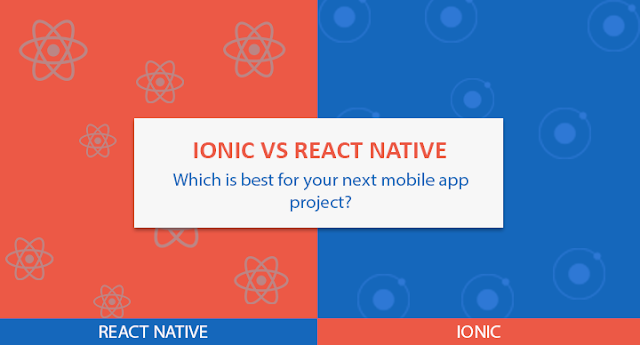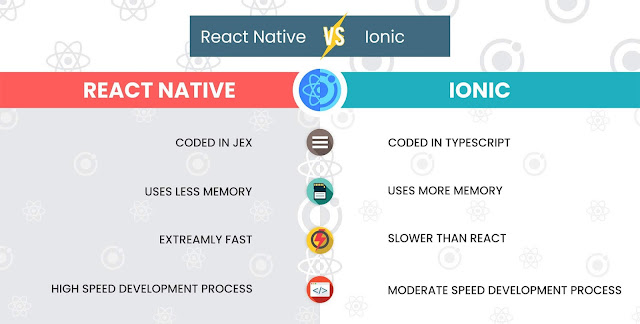React Native Vs. Ionic what to choose for your next project?
Mobile is the primary need for every individual, and these days with over billions of users are using smart phones worldwide. With that, Mobile application frameworks have reached far enough to fill a gap between the ease of mobile application development and performance. With this growing popularity of mobile application these days many startups, mid scale and enterprises are moving towards mobile application solution to maximize user engagement.
Most of the app stores are populated with mobile application deployed either on Native app development platform or Hybrid app development platform with over billions of users are using it globally. Therefore, having visually rich and functionally robust mobile application becomes a main attraction of mobile users. They love to use mobile application which is having rich UI (User Interface) and better performance.
Native, or hybrid?
Before we dig into a divergence between IONIC and React Native framework, let’s first understand what hybrid and native apps are? Hybrid apps are mainly a web application inserted into a mobile application through WebView. These applications are built on using HTML5, CSS, and Jscript, and deploy the code on multiple platforms (Android & iOS) respectively.
While Native applications are developed using programming language offered by the respective platform, iOS apps are built using Objective-C or Swift programming language while Android is built using Java programming language. These programming languages are mostly platform dependent and only and not shared across the platform.
IONIC
IONIC framework developed by Drifty Co. software vendor for Apache Cordova back in 2015. Core objective of this framework is to develop hybrid mobile application which is having performance close to native platform. Ionic is based on SASS, CSS, HTML and AngularJS. IONIC framework can provide advance GUI and CLI, which can offer variety of features.
Ionic is typescript ready, so if you are well versed with AngularJS, you can comfortably develop app using Ionic. It comes with plugins and style components which make it easier for developers to create User Interface of an app. However, the UI is not native but can offer native like appearance.
Ionic framework runs on top of Cordova, which use to access the mobile phone’s hardware functionality. In other words, Cordova renders the web application in system browser which is known as WebView. Cordova, is not only used by hybrid frameworks, and Ionic is not the only framework that uses Cordova. Cordova uses native components like camera, contact etc. and allow WebView to access them seamlessly. However, it will be bit slower compared to React Native as if you are going to write HTML code to render app components. On top of that, if end user is having slow processor, it can lead to performance as well as graphical issues.
Ionic is based on AngularJS uses WebView to render application on mobile devices. So, if you are well versed with AngularJS you can easily build mobile application on Ionic. As the views and logics are separated similar to MVC pattern it increases the development speed as well as maintenance becomes easy. It also allows developers to preview the application in browser and devices instantly, means your changes takes effect immediately just by reloading your screen.
You got to download plug-in in order to access native features, let’s say if you want to use Google Maps inside your application it is essential to download plug-in associated with it. As we know new version of Ionic (Ionic2) has launched with better accessibility to native functionalities through JavaScript better to first version of Ionic.
Pros:
- Relatively faster development & testing cycle
- It cross platform, so you can deploy application on iOS and Android
- Ionic is easy to learn and work around with
- If you are AngularJS savvy, it’s easy for you to build app using Ionic framework
- You can use TypeScript to develop an application on multiple platform
- Access Native functionality using Cordova Plugins
- Angular can be learnt easily compared to React Native
Cons:
- Performance issue if you uses lots of call backs to native code
- It delivers behavioral UI based on operating system it works on
- Development of advance graphic or transition prove to be difficult to implement
Ionic is good to use for prototyping, or projects which requires faster development or to conclude large app requirements with lower budget, and performance is never a priority.
React Native
Facebook’s React Native is new sensation in mobile app development industry. Apps built using React Native are not Hybrid apps its native apps which delivers way to better performance than pure hybrid apps. You can write your code using react components and it will render as a native UI in your mobile app. Javascript that hold your app logic, processed through the system’s JS engine, so it does not need WebView to render UI, hence it deliver high quality performance same as Native applications.
Since popularity of React Native is growing quicker, it has big community of developers which let the developers seek help from community and learning is quicker too. Best part of React Native is that is uses JavaScript, hence, you can share code across multiple platforms. Having said that, React Native will use native component, means the user experience is close to pure native applications.
React Native is based on Jscript framework which is known as ReactJS that uses code which resembles HTML, but it is called JSX- as front-end logic and business logics can be written in the same file unlike MVC pattern. With React Native writing CSS is not easy, because the JSX rules are bit different. Developer need to learn how to create user interface using JSX components, since it’s entirely new. React Native developer can see the modification on the fly without recompile or rebuild the application.
Pros:
- React Native offers greater performance
- It offers cross platform deployment ability
- It offers better performance than Ionic since it process hardware functionality through native libraries not Cordova.
- It is easier to maintain large scale projects as if it follows strict design patterns and paradigms.
- React Native is more stable and gives native like experience
Cons:
- Process of converting HTML code to native code is a challenge and you must possess knowledge of Objective-C/Swift.
- It is primarily created for iOS so certain function on Android needs rework.
- React Native is built for more performance oriented apps where budget is not the major problem.
React Native or Ionic which is better?
It is entirely depends upon a number of factors like – business requirement, preferences, budget, development skills and many more. Both the platforms are different to each other and perform differently. It is very difficult to make a comment on which one is better but when it comes to performance React Native is far better compared to Ionic. Both the framework runs on Android and iOS operating systems and they both are having very healthy ecosystems.
Begin the React Native development company we always give our preference to React Native framework, but by saying this we are not underlining Ionic framework and its capability. Although it is not easy to learn React Native compared to Ionic, we can say that React Native offers a great environment that is inches closer to native app development. From development point of view React Native provides better solution and speed up development process without compromising on quality of your mobile application.
It depends upon your requirement to choose right framework to build and deploy your mobile application. We can’t declare one framework better than other. Choosing a framework is not only a personal preference but also considering criteria we have explained in this article. We evaluate your business requirement, and based on your set budget we recommend the best framework to build your application.
I hope you must get an idea about which framework you can choose for your next mobile application project. If you are looking for the best cross-platform app development solution, we can certainly help you leverage the benefits of both the framework. We at, TechnoBrains offers cost effective React Native & Ionic mobile app development based on your requirement and deliver it meeting your expectations. If you still have any doubt send us request a quote now for free consultation.




Comments
Post a Comment